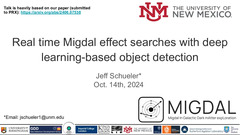A number of direct dark matter detection experiments invoke the Migdal effect to extend their sensitivities to sub-GeV masses; however, this effect has yet to be observed in nuclear scattering. The Migdal in Galactic Dark mAtter expLoration (MIGDAL) experiment aims to, for the first time, directly image and characterize the Migdal effect in nuclear scattering by recording high statistics of nuclear recoils in a low pressure optical gas time projection chamber (OTPC). The OTPC uses double glass GEM amplification with combined optical and charge readouts, capable of fully reconstructing 3D ionization tracks in the 50 Torr CF4 volume.
This talk will highlight results of commissioning runs in the presence of a high intensity neutron beam from a D-D generator. Additionally, we will introduce our novel application of YOLOv8 – a state-of-the-art deep learning-based object detection algorithm trained on real data – that enables real time Migdal effect searches on high resolution images recorded by the CMOS camera readout of the OTPC. Our simulation studies quantify YOLOv8’s ability to detect faint electronic recoils heavily obscured by bright overlapping nuclear recoils. The results of these studies illustrate the importance of mitigating diffusion and optical effects that obscure the electronic recoil signature of the Migdal effect. Finally, we apply YOLOv8 to a large sample of real data, demonstrating its ability to efficiently select Migdal effect candidates while reducing orders of magnitude of background.




Comment submit